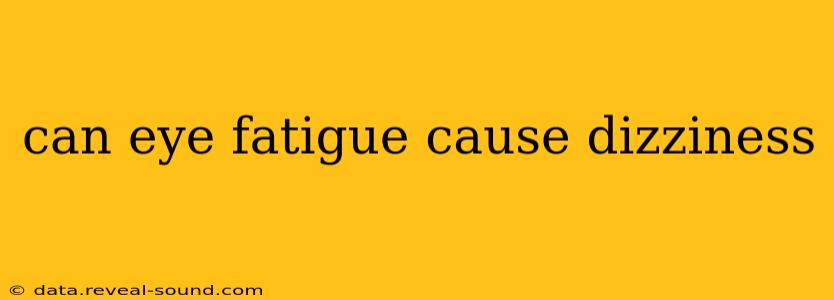Can Eye Fatigue Cause Dizziness? Understanding the Connection Between Eye Strain and Vertigo
Eye fatigue, also known as eye strain, is a common ailment characterized by discomfort and tiredness in the eyes. While it's usually caused by prolonged near-work activities like reading or computer use, it can sometimes manifest in surprising ways, including dizziness. But how exactly are these two seemingly unrelated symptoms connected? Let's explore the relationship between eye fatigue and dizziness.
What is Eye Fatigue?
Eye fatigue occurs when your eye muscles become overworked and strained. This can lead to a range of symptoms, including:
- Blurred vision: Difficulty focusing or seeing clearly.
- Headaches: Often located around the temples or forehead.
- Dry eyes: A feeling of dryness, irritation, or burning in the eyes.
- Neck and shoulder pain: Eye strain often contributes to muscle tension in the neck and shoulders.
- Sensitivity to light: Increased discomfort in bright environments.
How Can Eye Fatigue Lead to Dizziness?
The connection between eye fatigue and dizziness isn't always direct, but it's often related to the way our eyes and brain work together. Our eyes constantly send visual information to the brain, which uses this information to maintain balance and spatial orientation. When our eyes are fatigued, the information they send to the brain can be distorted or less reliable. This disruption can lead to:
- Vertigo: A sensation of spinning or movement, even when you're stationary. This is often more intense than simple dizziness.
- Lightheadedness: A feeling of faintness or unsteadiness.
- Imbalance: Difficulty maintaining balance and coordination.
Furthermore, the muscle tension associated with eye strain can also indirectly contribute to dizziness. Tension headaches, often a companion symptom of eye fatigue, can affect the blood flow to the brain, potentially causing dizziness or lightheadedness. Neck and shoulder pain, also common with eye strain, can further impact balance and contribute to feelings of dizziness.
What are the other symptoms that might appear along with eye fatigue and dizziness?
This is a common question amongst those experiencing these issues. The combination of eye fatigue and dizziness can be accompanied by a number of other symptoms, including:
- Blurry vision: As previously mentioned, blurry vision is a hallmark symptom of eye fatigue and can worsen the dizziness.
- Headaches: Often described as tension headaches, these are localized around the eyes and temples, adding to the discomfort.
- Nausea: Dizziness frequently leads to nausea, particularly if the dizziness is severe or prolonged.
- Neck pain: The muscular tension stemming from eye strain can extend to the neck, causing pain and stiffness, and exacerbating feelings of imbalance.
- Difficulty concentrating: Cognitive impairment often occurs alongside the physical symptoms.
How is eye fatigue diagnosed?
Diagnosing eye fatigue is typically straightforward, based on a thorough examination by an ophthalmologist or optometrist. They will assess your visual acuity, eye muscle function, and inquire about your symptoms and lifestyle. No specific tests are typically needed for eye fatigue, unless another underlying condition is suspected. If dizziness is a prominent symptom, further evaluation by a neurologist may be recommended to rule out more serious causes.
Can other conditions mimic the symptoms of eye fatigue and dizziness?
Yes, it's crucial to remember that dizziness and eye strain can be symptoms of various underlying conditions. These might include:
- Inner ear problems: Conditions such as vertigo or Meniere's disease can cause dizziness and occasionally eye strain due to the compensatory movements the eyes make to adjust to the inner ear issues.
- Migraines: Migraines are frequently associated with visual disturbances (aura) and dizziness.
- Neurological disorders: Rarely, neurological conditions can cause similar symptoms, requiring a comprehensive neurological evaluation.
How is eye fatigue treated?
Treatment for eye fatigue primarily focuses on alleviating the symptoms and preventing future occurrences. This can involve:
- Rest for your eyes: Taking frequent breaks from near-work activities. The 20-20-20 rule (every 20 minutes, look at something 20 feet away for 20 seconds) is often recommended.
- Proper lighting: Ensuring adequate lighting to reduce eye strain.
- Ergonomics: Adjusting your workspace to promote proper posture and reduce strain on your eyes and neck.
- Eye drops: Using artificial tears to lubricate dry eyes.
- Prescription eyewear: Correcting refractive errors can significantly improve eye comfort.
Important Note: This information is for general knowledge and does not constitute medical advice. If you are experiencing persistent eye fatigue or dizziness, it's crucial to consult a healthcare professional for a proper diagnosis and treatment plan. They can rule out any serious underlying medical conditions and recommend the appropriate course of action.
